I'm suing the Government of Canada
Part 1: Elections Canada's discriminatory hiring policy
This is going to be a bit of a different piece today, in that it focuses on my personal experience undergoing hardship related to the Government of Canada’s COVID-19 policies. Part of me hesitates to discuss this publicly as there are many others suffering far more than I could ever claim to, and the last thing I’d ever want is to feign victimhood, at risk of diverting attention from those who need support more urgently.
However, I believe my story is important in that it highlights a failure of the Canadian government that affects far more people than just me. I was discriminated against because of a disability. But the standard applied in my case is so broad that it could be used to justify discrimination by the government against anybody, at any time, for any reason—especially those with an identifiable characteristic that is supposed to be protected from discrimination, like disability, sex, gender identity, ethnicity, religion, and so on.
Let me take you through my case, and explain why I’m taking the Government of Canada to federal court. This story will span multiple articles, but I believe it will be well worth the read.
What happened?
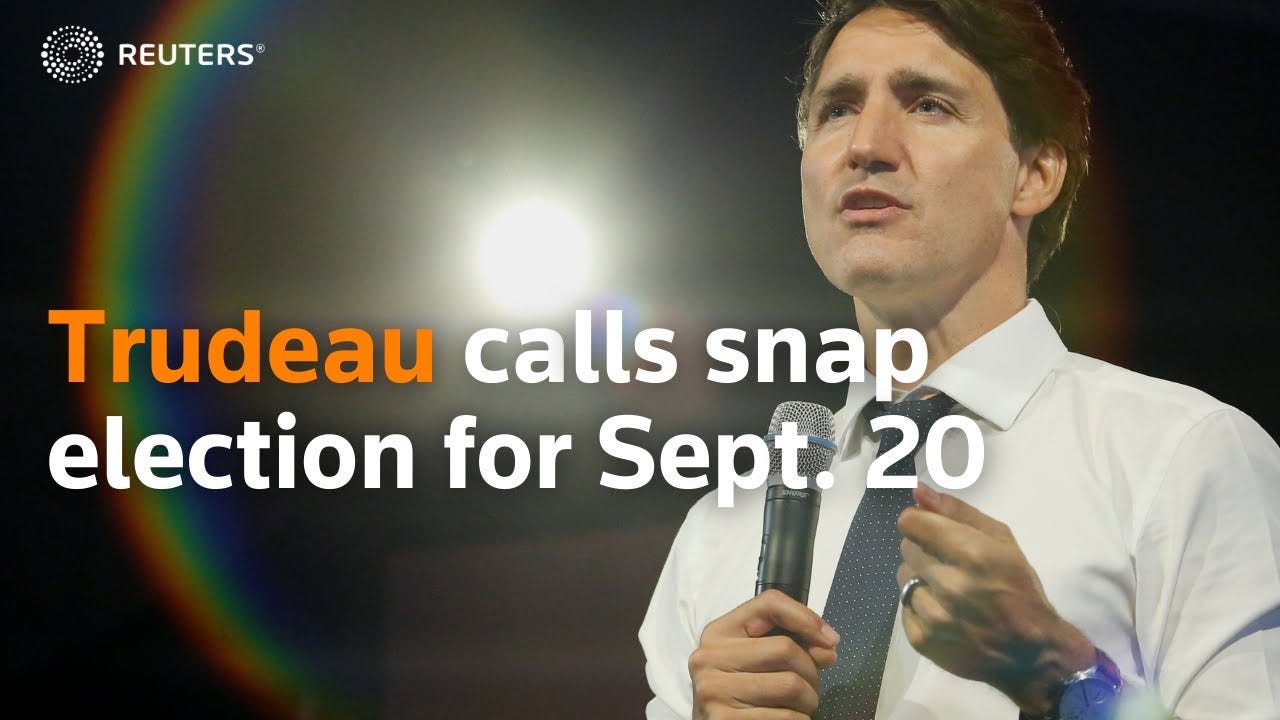
On August 15, 2021, Prime Minister Justin Trudeau announced a federal election would take place on September 20, 2021.1
I decided to apply to work at the polls, giving me a chance to engage in our electoral system and gain valuable experience in how Canadian democracy functions on the ground. On September 3, 2021, I received a call from a recruitment officer working for Elections Canada, who offered me a job as Deputy Returning Officer (DRO). It would involve work on election day itself as well as some preparatory work in the days leading up. I happily accepted the job offer.
I proactively informed the recruitment officer that I was unable to wear a mask for medical reasons, and she asked me to provide a doctor’s note. I explained that the public health order in effect at the time did not require me to provide a doctor’s note for me to be exempt from the province’s mandatory mask policy, nor did any other law or guideline impose such a requirement in order to have my disability accommodated by Elections Canada. She replied that this would not be a problem, and we proceeded to discuss training and other next steps.
In no uncertain terms, I was still employed as of the end of that phone call. I even received further emails asking me to register for specific training dates.
However, on September 7, 2021, I received a followup email informing me that my offer of employment had been withdrawn:
Further to our telephone discussion about your work as a DRO for the federal election on September 20th in West Vancouver, we have determined that a requirement of the position will be to wear a mask which is a safety requirement of this position.
As you advised that you have a medical mask exemption, we will not be able to employ you as a DRO on election day.
The language here is unambiguous: I was being denied employment based on the fact that I “have a medical mask exemption.” And because Elections Canada had “determined that a requirement of the position will be to wear a mask,” no accommodations would be considered. Simply put, Elections Canada did not hire me solely on the ground that I had a disability.
My disability
I have previously spoken publicly about my journey with mental health challenges. For those that are interested, I recommend listening to this excellent discussion I had with
and on Rounding the Earth back on March 14 of this year.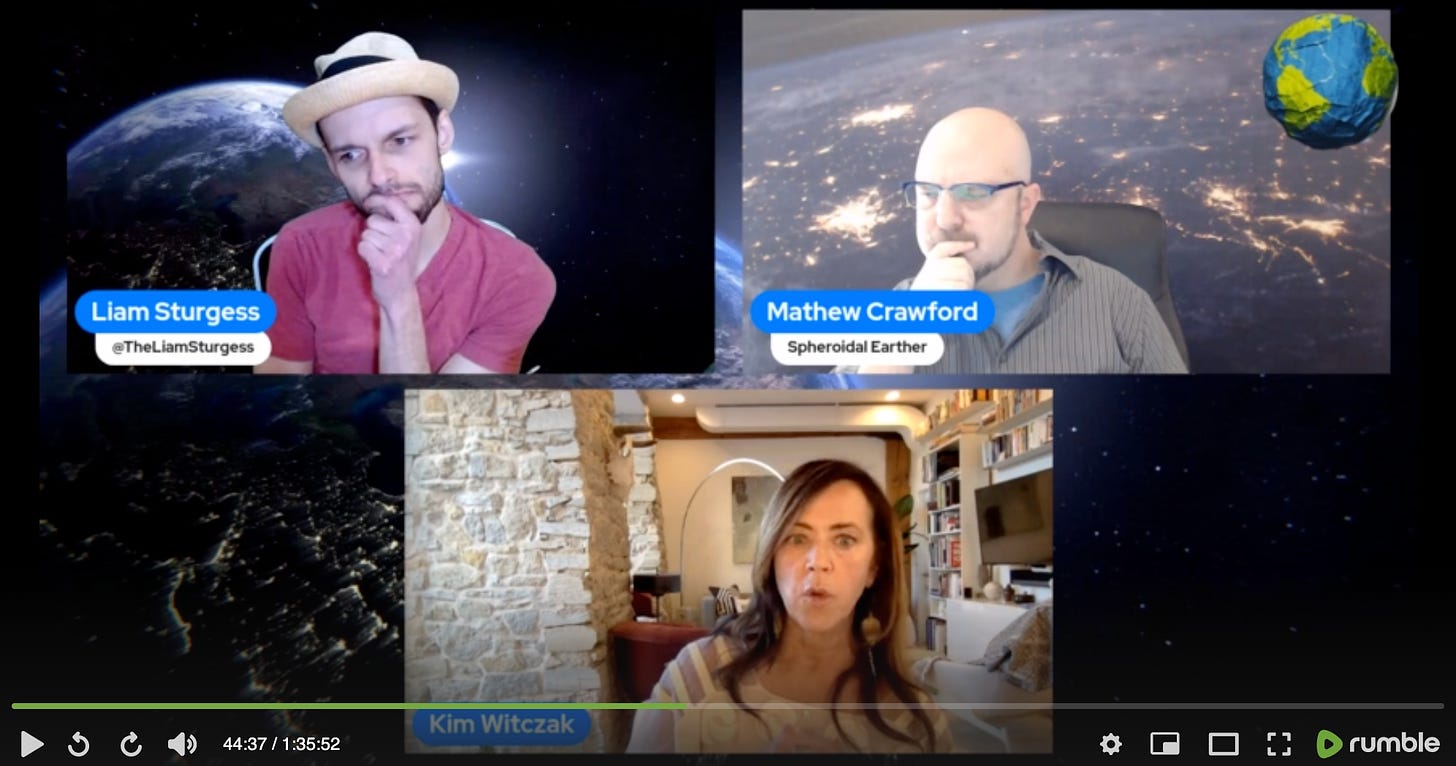
We go into some length about mental health in general, but also our individual experiences navigating the pharmaceutical solutions offered for psychological challenges, including the heartbreaking loss of Kim’s husband Woody.
As for myself, I was diagnosed with depression and generalized anxiety disorder in 2013, along with attention deficit hyperactive disorder (ADHD) and “obsessive-compulsive tendencies.” I have been on various medications over the course of ten years as part of my treatment process, which have helped to varying degrees. I’ve benefited from local youth mental health services, as well as telemedicine when COVID-19 kicked off in 2020.
In the end, the real healing has come out of the normal process of growing into an adult. At this point in time, I can confidently say that these mental health challenges don’t define my quality of life, nor do they define who I am as a person.
But as I’m sure anybody who has worked through similar mental health challenges can relate to, a big part of this growth involves setting healthy boundaries and learning how to navigate the limitations of my own body and mind. For example, I grew up with an abnormal sensitivity to physical touch; as an adult, this has required me to consciously recalibrate my sense of physical self so as to be able to interact with others in a healthy way.
Similarly, I grew up with coping mechanisms to mask and dampen my anxiety. One of these lingers to this day: in person or on video, you may from time to time catch me covering my mouth with my hand or shirt. This isn’t something unique to me, or even to people suffering from mental health issues; covering the mouth is a well-documented sign that somebody is nervous or anxious. But in my case, it is a chronic issue attached to a long-term mental health challenge. It is tied to intense psychological distress, the nature of which is fundamentally tied to my mental and physical health.
I am proud that I have grown to a place where I can manage this in a healthy way, such that I don’t live in a state of suffering on a daily basis. In other words, I’m not complaining! And I’m very proud to be who I am. I am proud of the work I’ve done to get to where I am, and I admire my own ability to manage and navigate this and other similar challenges in the landscape of my psychological wellbeing.
When the COVID-19 pandemic was initially declared, I attempted to suffer through wearing a mask, which resulted in severe psychological and emotional trauma that increasingly affected my ability to focus and maintain my health. I soon accepted that I would need to seek alternatives in order to avoid completely derailing years of growth.
Exemptions from mask requirements
Thankfully, the various agencies and organizations that instituted mask requirements and guidelines made sure to account for situations like mine. From municipal to federal, from government to advocacy group, institutions across the spectrum provided exemptions for people unable to wear a mask or face covering for a variety of reasons, including disability, medical, psychological and other such factors.
I was successfully accommodated at school simply by informing them that I was unable to wear a mask, and I was accepted with open arms and without challenge. My experience with businesses and restaurants was less positive, as many people were unaware that such exemptions from mask mandates even existed. But when push came to shove, my disability was accounted for in the law and in public health guidance.
BC Ministry of Health’s Public Health Order
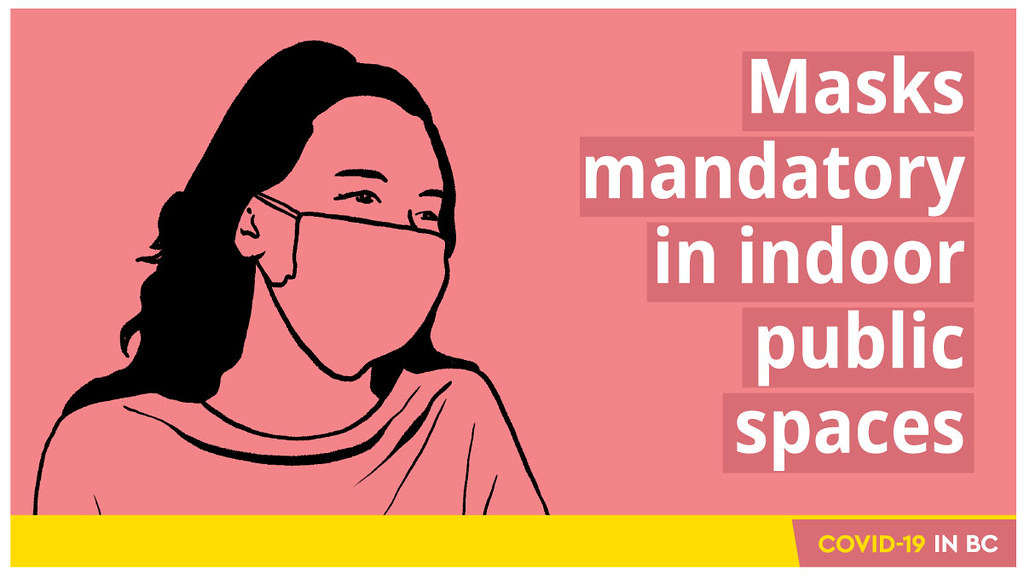
On August 24, 2021, British Columbia’s Provincial Health Officer Dr. Bonnie Henry announced that face masks would be mandatory in all indoor public spaces as of the following day. The official press release included the following note:2
People who cannot wear a mask or who cannot put on or remove a mask without the assistance of others are exempt. A person may not be able to wear a mask for a psychological, behavioural or health condition, or due to a physical, cognitive or mental impairment.
Having already applied for the job at Elections Canada at this point in time, I familiarized myself with what the steps were in order to be considered exempt under the public health order, as well as any other legal or procedural requirements. This way, I could successfully communicate my exemption to Elections Canada while not providing them with an inappropriate level of detail, allowing them to accommodate me as appropriate without obstacle. Anyone who knows me won’t find this surprising, as I have kept myself well-educated on the local, provincial and federal restrictions since long before I started asking questions about them, and I continue keeping myself informed to this very day.
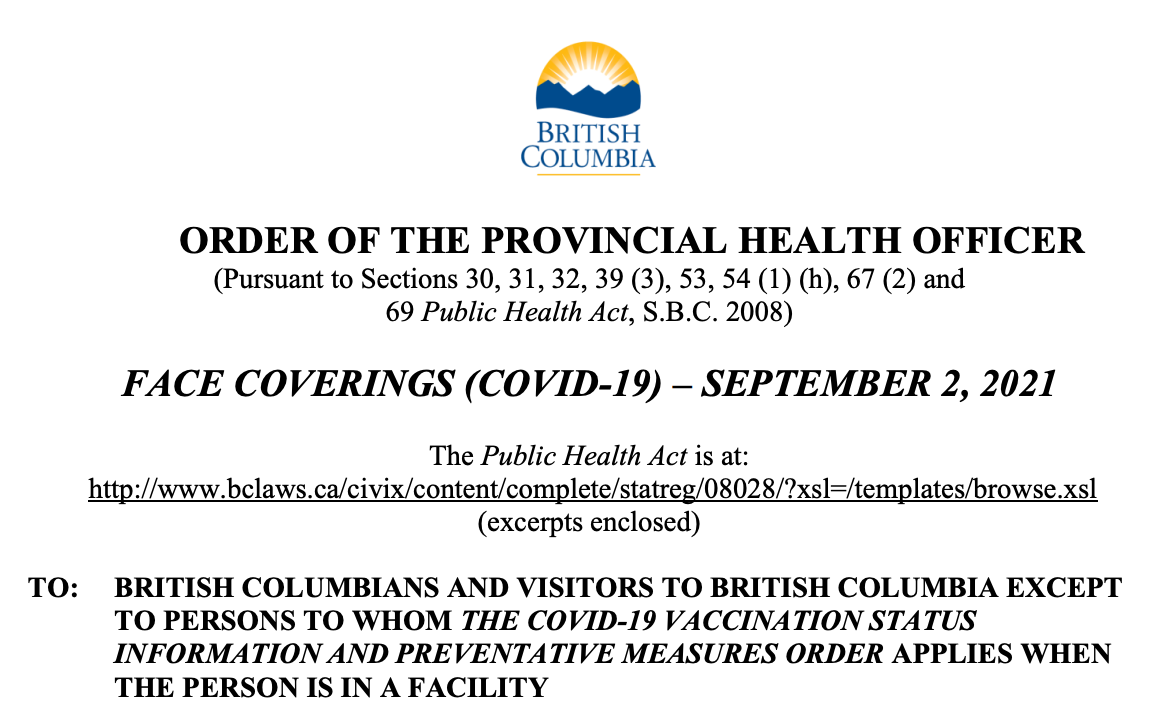
The public health order was formally issued in written form on September 2, 2021.3 This updated version of the order contained even more explicit details on who was exempt from the mask requirement, and the process for employers to accommodate their workers. Most importantly, the order did not call for anything like a doctor’s note in order for exemptions to be recognized. The language was clear and simple: the requirement to wear a mask did not apply to people unable to wear a mask for the described reasons.

Note that there is a caveat: had Elections Canada accommodated my exemption from the order, I would not have been allowed to “provide a face-to-face service to a visit unless there [was] a physical barrier between the operator or worker and the visitor.”
Don’t get me wrong—I don’t believe Bonnie Henry or her staff at the Ministry of Health decided to include this in the order out of the kindness of their hearts. The truth is that they had to include it in order to ensure they weren’t breaking provincial and federal human rights law. Employers are not allowed to discriminate against employees based on grounds protected under the Canadian Human Rights Act, or its provincial equivalents, like the Human Rights Code in British Columbia. They must, by law, accommodate people with protected characteristics all the way up to the point of “undue hardship.” Anything shy of that is against the law. If Bonnie Henry had issued the mask order without providing for human rights exemptions, it would likely have caused the entire order to be struck down upon the first challenge.
But don’t take my word for it…
BC Human Rights Commission
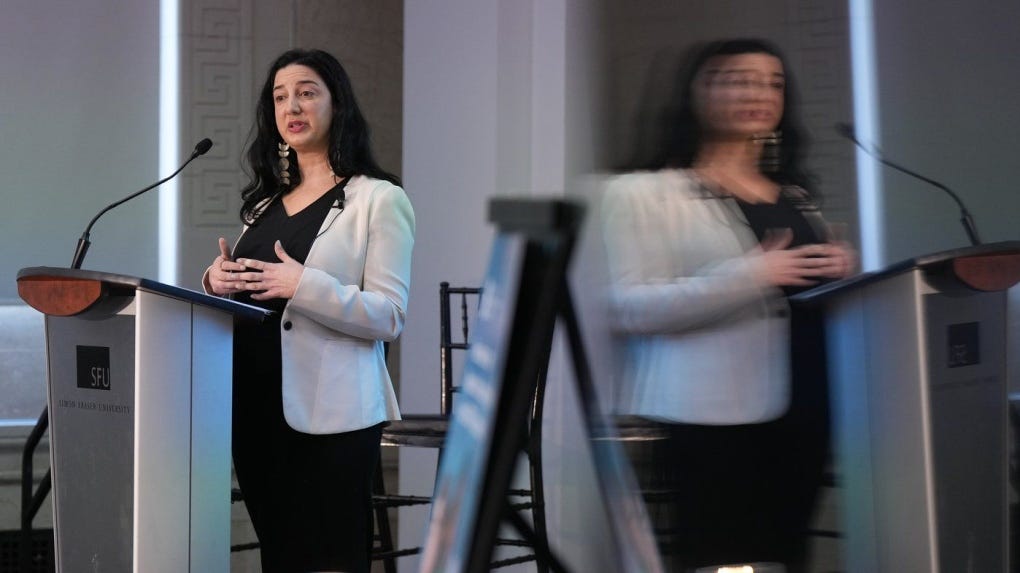
As described by the Legislative Assembly of British Columbia, the BC Human Rights Commissioner is an officer of the provincial government “responsible for protecting and promoting human rights.”4 Commissioner Kasari Govender and her office are the province’s primary human rights authority.
On November 5, 2020, Commissioner Govender published a guidance document titled “A human rights approach to mask-wearing during the COVID-19 pandemic.” This document was “updated over time to reflect changing circumstances,” with revised versions published on November 23 and December 10, 2020, and April 23, July 22 and September 29, 2021.5
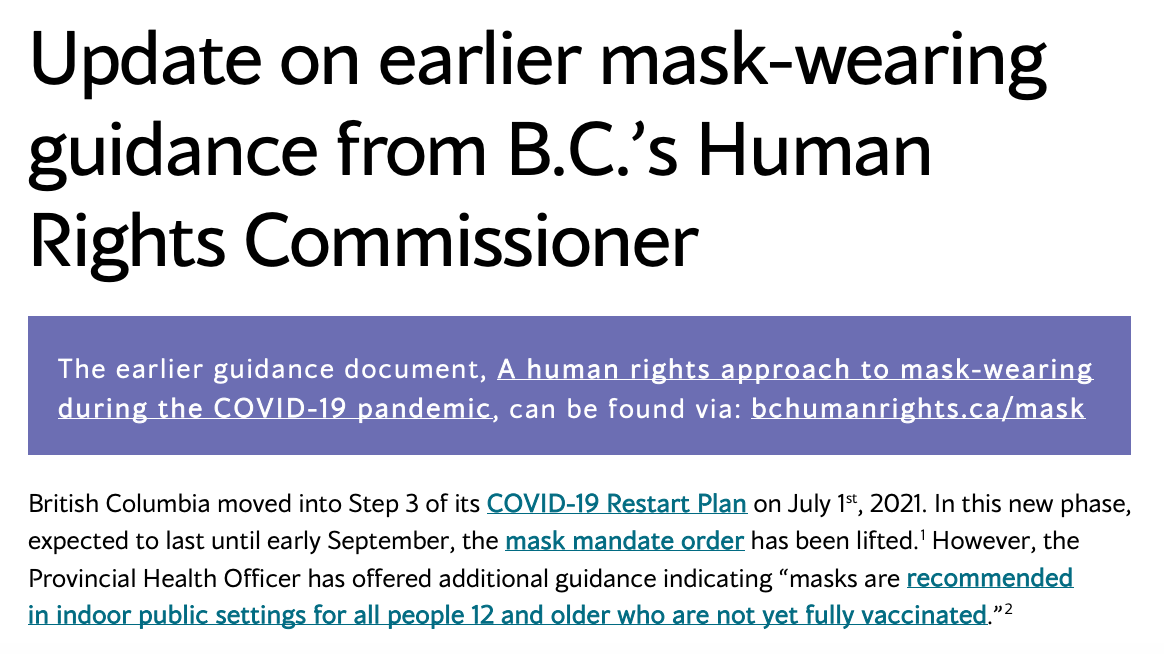
The version published on July 22, 2021 clarifies how “mask-wearing exemptions and accommodations” should be handled in the Province of British Columbia:
If someone identifies a reason they are unable to wear a mask that is based on a protected ground under B.C.’s Human Rights Code (such as disability or medical condition), duty bearers—that is, those who have a legal obligation or responsibility to respect, protect and fulfil human rights, including employers, housing providers and other service providers—should accommodate their needs to the greatest extent possible. For shorter-term interactions or where accommodations are relatively easy to implement, duty-bearers should not require medical information to do so. If it is necessary to request medical information, it should only be sought to the extent necessary to determine the limitations and restrictions an individual has in relation to mask-wearing and how they can be accommodated.
By its very nature, the employment opportunity in question was always going to be “shorter-term,” with only one Election Day and just a few days of preparation. No long-term employment relationship was proposed or on the table, though it must be noted that there are severe long-term impacts resulting from Elections Canada’s discriminatory policy, which I will go over later. And for reasons I will explain shortly, it is unquestionable that the accommodations were “relatively easy to implement.” As far as requesting medical information goes, the recruitment officer asked me for a doctor’s note, but it didn’t wind up being terribly relevant given Elections Canada chose not to allow for any accommodations on any grounds, even if I had provided such a note. This is vital for readers to internalize.
An updated version of the guidance document was published in response to Bonnie Henry’s September 2, 2021 public health order, which was even more explicit:
An inability to access or use a mask or an inability to follow a health and safety procedure must not lead to automatic negative consequences such as employee discipline or termination, complete denial of service or eviction from housing. …
Where the relationship is brief, I recommend duty bearers accommodate those who are unable to wear masks without requiring them to provide medical information, as this is sensitive personal information. In an August 2021 decision, the B.C. Human Rights Tribunal (BCHRT) found that individuals do not need to reveal details about their disability when seeking accommodation, but they should inform a duty bearer, such as a service provider, that they require some form of disability-related accommodation.
Also published by the Commissioner’s office was a helpful poster titled “Guidelines for people unable to wear a mask as required in British Columbia,” which clearly states “if a person claims a valid reason they cannot wear a mask, take them at their word. Proof should not be required.”6 This is present on the versions published in both July and October 2021 (pictured below).7
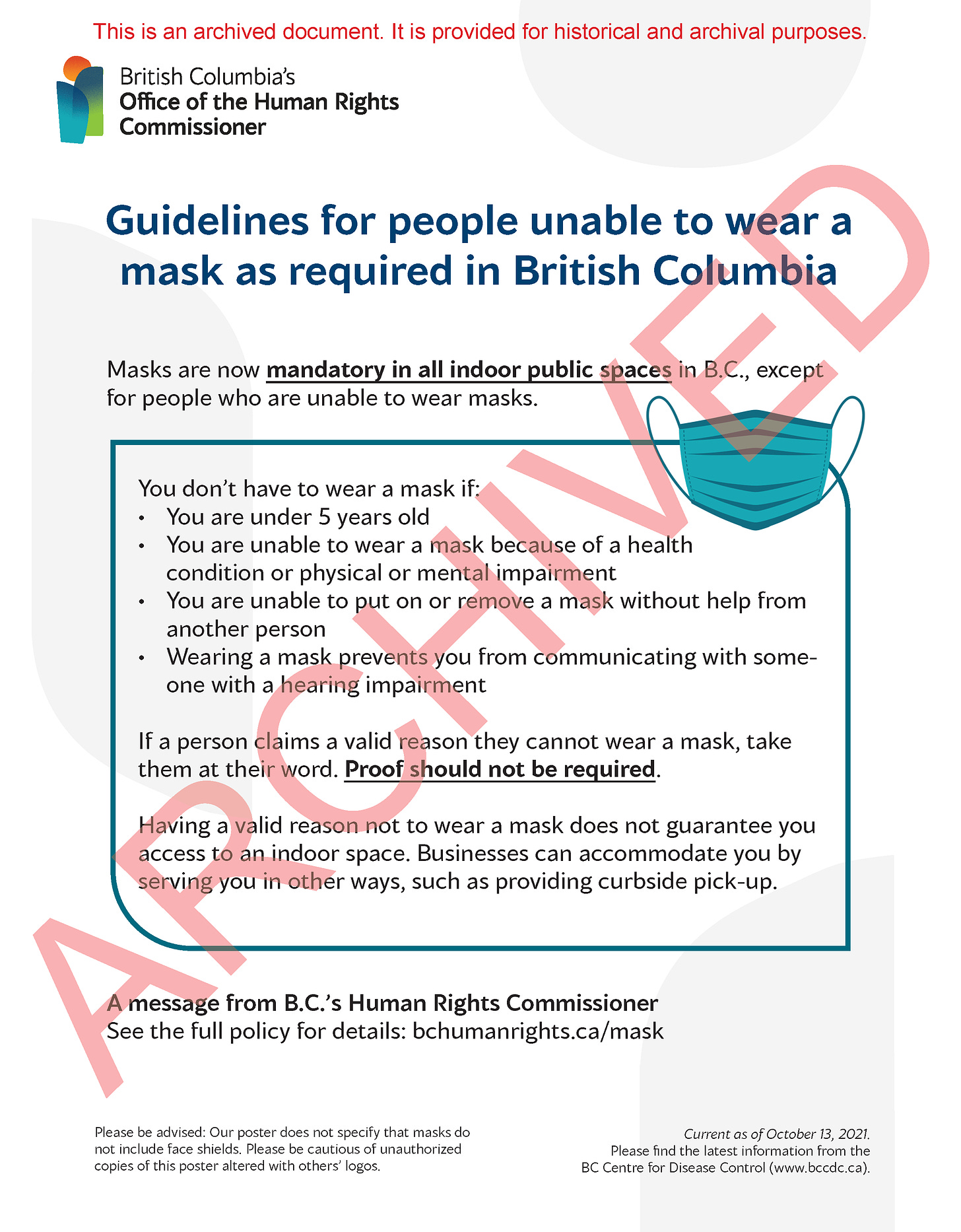
BC Human Rights Clinic
Finally, the BC Human Rights Clinic published an article on October 7, 2020, titled “Mandatory Masks and Human Rights”.8 The piece, authored by articling student Emily Zarychta, offered the following:
Under human rights law, people with disabilities have the right to be accommodated to the point of undue hardship. That may mean exempting them from the requirement to wear a mask, or finding other ways to accommodate their disability-related needs. …
A person is not required to share private details about their disability. Medical information is highly sensitive and personal. While a person may have to identify that they have a disability in order to be appropriately accommodated, they should not be pressed for details about their condition.
In short, Elections Canada failed to engage in any process of accommodation whatsoever, denying me the opportunity to work at the 2021 general election due to the fact that I have a disability. Because I communicated my medical exemption to the recruitment officer, the offer of employment was revoked.
In so doing, Elections Canada violated its duty to accommodate under the Human Rights Act. Unfortunately, this was just the beginning of my troubles. In my next article, I will walk you through the process of filing my complaint with the Canadian Human Rights Commission.
For now, I want to thank each and every one of you who took the time to read my story so far. I want to reiterate that I have nothing to gain out of this other than making sure Canada is, indeed, a country that practices what it preaches, and that the government can’t wave away entire identifiable classes of people when it deems them inconvenient or otherwise unwelcome.
Stay tuned for Part II…
Aiello, R. (2021, August 15). Trudeau calls federal election, voters to go to the polls Sept. 20. CTV News. http://archive.today/2021.08.16-154655/https://www.ctvnews.ca/politics/federal-election-2021/trudeau-calls-federal-election-voters-to-go-to-the-polls-sept-20-1.5547815
BC Ministry of Health. (2021, August 24). Mask mandate to reduce transmission, protect people in public spaces | BC Gov News. Government of British Columbia. https://web.archive.org/web/20231105213834/https://news.gov.bc.ca/releases/2021HLTH0053-001665
Henry, B. (2021, September 2). Order of the Provincial Health Officer - Face Coverings (COVID-19) - September 2, 2021. Government of British Columbia. https://web.archive.org/web/20210902203012/https://www2.gov.bc.ca/assets/gov/health/about-bc-s-health-care-system/office-of-the-provincial-health-officer/covid-19/covid-19-pho-order-face-coverings.pdf
Human Rights Commissioner. Legislative Assembly of British Columbia. Retrieved November 5, 2023, from http://archive.today/2023.11.05-223906/https://www.leg.bc.ca/dyl/Pages/Human-Rights-Commissioner.aspx
A human rights approach to mask-wearing during the COVID-19 pandemic. BC’s Office of the Human Rights Commissioner. Retrieved May 15, 2023, from http://archive.today/2023.05.15-191203/https://bchumanrights.ca/publications/mask/
Poster: Exemptions to the mandatory mask order in British Columbia. (2021, July 1). British Columbia’s Office of the Human Rights Commissioner. https://web.archive.org/web/20210920061020/https://bchumanrights.ca/mask-poster/
Poster: Guidelines for people unable to wear a mask as required in British Columbia. (2021, October 13). BC’s Office of the Human Rights Commissioner. https://web.archive.org/web/20230518050523/https://bchumanrights.ca/mask-poster/
Zarychta, E. (2020, October 7). Mandatory Masks and Human Rights. BC Human Rights Clinic. https://web.archive.org/web/20231106000426/https://bchrc.net/mandatory-masks-and-human-rights/

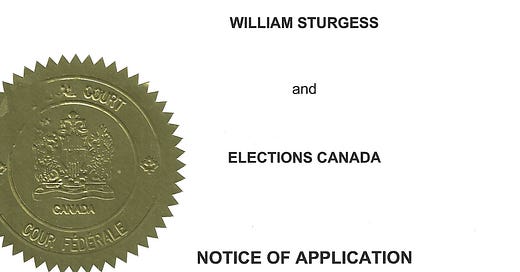



Good for you this is a fantabulous human rights issue that affects so many individuals without your skills and courage to challenge the system when it abuses the public. Couldn't be prouder and know the research will be meticulous. What's always is a bit surprising that such a talented, well informed, articulate and charismatic figure isn't overflowing with confidence but I'll chalk it up to humility with sky high aspirations.. like the supermodel effect where they feel less than the magazine image & insecure about their looks, missing entirely how far their imperfect selves are beyond what average folks look like.. ooh another theory maybe you are too handsome!! <3
I hope you get a judge that's tired of the nonsense and lays it all out.
As frustrating as bad decisions can be, good ones are always juicy to read.